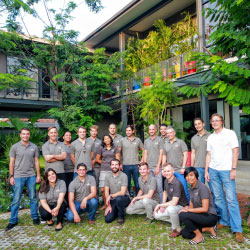We believe the first step to a student being a socially aware citizen is to see and respect the world as it is.
Our Asia educational travel programs for high school and university students are designed to limit the negative physical impact on our planet:
- We work hard to protect the human rights of our staff, travelers, suppliers and local communities.
- We work towards protecting the environment, both locally and globally, by using resources in an efficient, fair and responsible way.
- We ensure that our stakeholders are treated with fairness and respect.
- We support and encourage fair employment practices.
- Our programs are designed to protect all wild and domestic animals we encounter. We never offer or promote venues where animals are exploited, and we actively encourage customers, staff and local communities to be animal friendly travellers.
- Our research and relationships with the communities that we work with ensures that all our projects truly benefit the local community.
- We ensure ongoing support for communities and longevity of projects. We listen to the needs of communities first and foremost.
- All our programs align with the UN’s Global Sustainable Development Goals.
Partner NGOs and Community Organizations
At KHIRI CAMPUS, we have two clients on every program – our communities and our groups. We partner with community organizations and local NGOs (non-governmental organisations) to ensure that the UN’s Sustainable Development Goals are responsibly and effectively integrated into our programs.
Our approach means that we balance everyone’s needs and requirements, ensuring our groups and partner organisations experience a truly transformational journey.
KHIRI CAMPUS staff carry out due diligence on our partner organisations, making sure that the programs we run contribute to sustainable development. Transparency and accountability is key in this process.
We build long-term relationships with the communities we work with and respect local expertise when making decisions.
We never work with NGOs and community organisations that promote or engage in orphanage tourism, modern slavery, destroying wildlife and natural habitats, harming wild animals, or deliberately harming the environment.
Engaging For Sustainability
In recent years ‘voluntourism’ has become extremely popular among those wishing to spend time in a different country and give something back at the same time. However, in some cases, these good intentions do not always result in positive outcomes.
Time spent volunteering abroad is not a replacement for a ‘traditional’ holiday. So, how do you ensure that your volunteering experience is truly responsible and sustainable? We recommend asking yourself the following questions to help you decide whether any volunteering program or activity will be sustainable for your team and the host community:
- Do my team’s skills match the project?
- Is there any evidence that the project is based on local need and is there a transfer of skills between volunteers and local people?
- Do you know how and where your money will be spent?
- Are you provided with evidence of how the program benefits local people and the local environment?
- Will you be provided with pre-trip training on local customs and culture that will enhance the experience for your team and locals alike?





